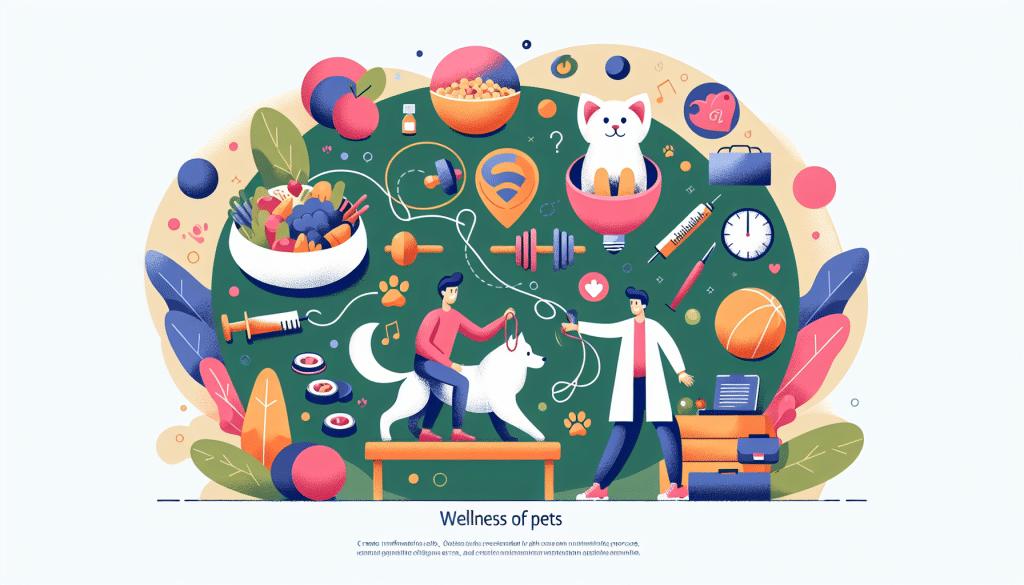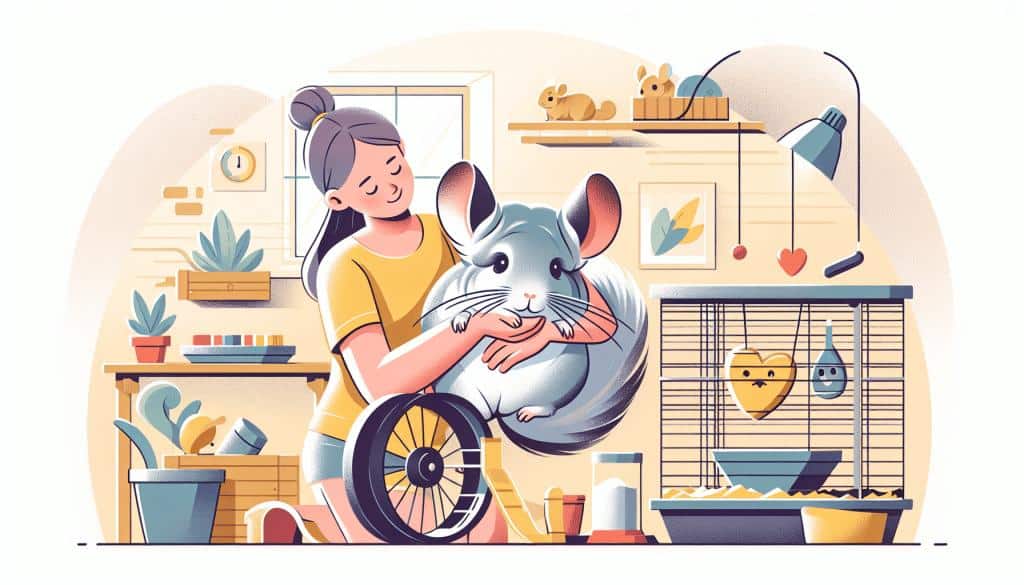You think you’re doing everything right for your beloved pet’s health and wellness; regular check-ups, quality food, and plenty of exercise. But are you missing something crucial? This article will reveal the often overlooked tips and tricks that every pet owner should know in order to maintain their furry friend’s health and wellness. From the importance of dental care to the benefits of mental stimulation, get ready to discover the secrets to keeping your pet in tip-top shape. Don’t wait until it’s too late – learn how to be proactive and ensure your pet’s wellbeing today.

Regular Veterinary Checkups
Understanding the Importance of Routine Visits
Regular veterinary checkups are an essential aspect of responsible pet ownership. These routine visits allow your veterinarian to assess your pet’s overall health and detect any potential issues early on. By bringing your furry friend to the vet regularly, you are taking a proactive approach to their well-being and ensuring that any health concerns are addressed promptly.
Vaccinations and Preventive Medications
During regular checkups, vaccinations and preventive medications are administered to protect your pet against various diseases and parasites. Vaccinations help to strengthen your pet’s immune system and prevent the spread of infectious diseases. Preventive medications, such as flea and tick treatments, heartworm preventives, and regular deworming, are crucial for keeping your pet healthy and free from harmful parasites.
Dental Assessments and Treatments
Dental health is often overlooked, but it plays a crucial role in your pet’s overall well-being. Regular veterinary checkups include dental assessments and treatments to ensure that your pet’s teeth and gums are in good condition. Dental issues, such as gum disease and tooth decay, can lead to pain, infections, and even systemic health problems if left untreated. By addressing dental issues early on, you can prevent unnecessary suffering and maintain your pet’s oral health.
Early Detection of Health Issues
One of the most important reasons for regular veterinary checkups is the early detection of health issues. Pets are masters at hiding signs of illness, making it challenging for owners to identify potential problems. However, veterinarians are trained to recognize subtle signs and symptoms that may indicate underlying health issues. Routine checkups allow for thorough physical examinations, blood tests, and other diagnostic procedures that can catch diseases and conditions in their early stages. This early detection greatly increases the chances of successful treatment and a positive prognosis for your beloved pet.
Balanced and Nutritious Diet
Identifying Appropriate Food for Your Pet’s Age and Breed
Providing your pet with a balanced and nutritious diet is essential for their overall health and well-being. Different pets have different dietary requirements based on factors such as age, breed, size, and activity level. It is important to consult with your veterinarian to determine the appropriate type and amount of food for your pet. They can provide guidance on choosing high-quality pet food that meets your pet’s specific nutritional needs.
Understanding Nutritional Needs and Food Labels
Understanding your pet’s nutritional needs is crucial when selecting their food. Pet food labels can be overwhelming with unfamiliar terms and claims. It is essential to learn how to read these labels and understand what they mean. Look for ingredients that provide essential nutrients and avoid those with fillers or artificial additives. Your veterinarian can help you navigate through the confusing world of pet food and guide you on making informed decisions about your pet’s diet.
Avoiding Toxic Foods and Harmful Human Snacks
Many foods that are safe for humans can be toxic to pets. It is important to be aware of these foods and make sure they are kept out of your pet’s reach. Chocolate, grapes, onions, garlic, and certain artificial sweeteners are just a few examples of foods that can be harmful or even fatal to pets. Additionally, feeding your pet from your own plate can lead to weight gain and nutritional imbalances. Stick to a balanced diet specifically formulated for your pet and avoid sharing your meals.
Importance of Fresh Water and Controlled Feeding Schedules
Providing fresh water at all times is vital for your pet’s hydration and overall health. Make sure that your pet always has access to clean water, especially during hot weather or after physical activity. Additionally, establishing controlled feeding schedules helps to maintain a healthy weight and prevent overeating. Consult with your veterinarian to determine the appropriate amount of food and feeding frequency for your pet.

Weight Management
Monitoring Your Pet’s Weight Regularly
Keeping track of your pet’s weight is crucial for their overall health and longevity. Regularly monitoring your pet’s weight allows you to detect any changes that may indicate a potential health issue. Sudden weight loss or gain can be a sign of an underlying problem such as thyroid issues or organ dysfunction. By addressing weight changes promptly, you can prevent more serious health complications and ensure that your pet maintains a healthy weight.
Exercise Recommendations
Exercise is an essential component of maintaining your pet’s weight and overall health. Different pets have different exercise needs based on their breed, age, and energy level. Regular physical activity helps prevent obesity, promotes cardiovascular health, and stimulates mental well-being. Consult with your veterinarian to determine the appropriate exercise routine for your pet. They can provide guidance on the duration and intensity of exercise based on your pet’s individual needs.
Dietary Adjustments for Overweight Pets
If your pet is overweight, dietary adjustments may be necessary to help them reach a healthy weight. Your veterinarian can create a customized weight loss plan that includes portion control and balanced nutrition. They can recommend specific weight-loss diets or advise on reducing calorie intake while still providing all necessary nutrients. Regular monitoring and adjustments to their diet will help your pet achieve and maintain a healthy weight, reducing the risk of weight-related health issues.
Health Risks Associated with Obesity
Obesity in pets can lead to numerous health risks and complications. Joint problems, diabetes, heart disease, respiratory issues, and decreased lifespan are just a few of the consequences of excess weight. By managing your pet’s weight and preventing obesity, you significantly reduce the risk of these health problems. Regular checkups with your veterinarian can help assess your pet’s weight and provide guidance on maintaining a healthy body condition.
Exercise and Mental Stimulation
Tailoring Exercise to Your Pet’s Species and Breed
Different species and breeds have different exercise requirements. For example, a high-energy dog breed may need more intense and frequent exercise, while a sedentary cat may require more mental stimulation. Tailoring exercise to your pet’s species and breed ensures that their physical and mental needs are met. Consult with your veterinarian to determine the appropriate exercise routine that considers your pet’s individual characteristics.
Interactive Toys and Games
Interactive toys and games are not only fun but also provide mental stimulation for your pet. These toys can help alleviate boredom, prevent destructive behaviors, and improve cognitive function. Puzzle toys, treat-dispensing toys, and interactive play sessions are all excellent ways to keep your pet mentally engaged. Engaging with your pet through play and interaction strengthens your bond and contributes to their overall well-being.
Training and Obedience Classes
Training and obedience classes are not only for puppies but also for pets of all ages. These classes provide mental stimulation, socialization opportunities, and build a strong foundation of obedience. Through training, you can teach your pet essential commands, establish boundaries, and address behavioral issues. Additionally, the structured environment of classes can help your pet to develop confidence and improve their overall behavior.
Socialization and Its Benefits
Socialization is an essential aspect of your pet’s mental well-being. Exposure to various environments, people, and animals at a young age helps your pet develop into a well-adjusted and confident adult. Regular socialization improves their communication skills, reduces anxiety, and prevents behavioral problems. It is crucial to expose your pet to positive social experiences and provide opportunities for interaction with other animals and humans.

Grooming Essentials
Regular Bathing and Brushing
Regular bathing and brushing are essential for maintaining your pet’s coat and skin health. Bathing removes dirt, allergens, and parasites while keeping the skin clean and odor-free. Brushing helps to remove loose hair, reduce shedding, and prevent matting. The frequency of bathing and brushing depends on your pet’s breed, coat type, and activity level. Consult with your veterinarian or a professional groomer to determine the appropriate grooming routine for your pet.
Nail Trimming and Paw Care
Trimming your pet’s nails is not only important for their comfort but also for their health. Overgrown nails can cause pain, difficulty walking, and even lead to infections. Regular nail trimming prevents these issues and promotes proper foot structure. Additionally, keeping an eye on your pet’s paws allows you to detect any injuries or abnormalities. It is important to establish a positive and gradual nail trimming routine to ensure your pet’s cooperation and comfort.
Ear Cleaning and Eye Care
Regular ear cleaning helps prevent ear infections, especially in breeds with floppy or hairy ears. Your veterinarian can show you how to properly clean your pet’s ears and recommend suitable ear cleaning products. Eye care involves regularly checking your pet’s eyes for any signs of redness, discharge, or irritation. Keeping the eye area clean and removing any debris helps prevent eye infections and maintains good ocular health.
Professional Grooming Services
In addition to regular at-home grooming, professional grooming services are beneficial for many pets. Professional groomers have the expertise and tools to provide a thorough and safe grooming experience. They can trim your pet’s hair, groom their coat, clean their ears, and even perform specialized grooming procedures as needed. Regular visits to a professional groomer ensure that your pet’s grooming needs are met, enhancing their overall hygiene and appearance.
Parasite Prevention
Flea and Tick Treatments
Fleas and ticks are common external parasites that can cause a range of health issues in pets, including skin irritations, infections, and the transmission of diseases. Regular preventive treatments, such as topical or oral medications, should be administered to protect your pet from these parasites. Consult with your veterinarian to determine the most effective and safe flea and tick prevention methods for your pet.
Heartworm Prevention
Heartworm disease is a potentially fatal condition transmitted by mosquitoes. Preventive medications are available to protect your pet from heartworm infection. These medications should be administered as directed by your veterinarian, usually on a monthly basis. Regular heartworm prevention is crucial, as treatment for heartworm disease can be costly and the disease can cause irreversible damage to your pet’s heart and lungs.
Regular Deworming
Internal parasites, such as roundworms, hookworms, and tapeworms, can cause numerous health issues in pets. Regular deworming treatments help eliminate these parasites and prevent infestations. The frequency of deworming depends on your pet’s lifestyle, age, and risk of exposure. Puppies and kittens often require more frequent deworming compared to adult pets. Your veterinarian can recommend the appropriate deworming schedule for your pet.
Recognizing Signs of Parasitic Infections
Being able to recognize the signs of parasitic infections is essential for prompt treatment and prevention of further complications. Symptoms can vary depending on the type of parasite, but common signs may include diarrhea, vomiting, weight loss, a dull coat, coughing, or itching. If you notice any unusual symptoms in your pet, it is crucial to consult with your veterinarian for an accurate diagnosis and appropriate treatment.
Pet Insurance
Understanding the Benefits of Pet Insurance
Pet insurance provides financial coverage for unexpected veterinary expenses. By having pet insurance, you can make decisions based on what is best for your pet’s health rather than the cost of treatment. Insurance coverage can help alleviate the financial burden of emergency vet visits, surgeries, medications, and ongoing medical treatments. It provides peace of mind knowing that you have the means to provide the necessary care for your beloved pet.
Comparing Different Insurance Plans
When considering pet insurance, it is essential to compare different plans to find the one that best suits your needs. Factors to consider include coverage limits, deductibles, reimbursement rates, waiting periods, and exclusions. Some plans offer comprehensive coverage for accidents, illnesses, and preventive care, while others may have limitations. Carefully review the terms and conditions of each plan to ensure you understand the coverage and associated costs.
Considering Pre-existing Conditions
Most pet insurance plans do not cover pre-existing conditions. These are health issues that your pet has been diagnosed with or shown symptoms of before the insurance policy starts. If your pet has a pre-existing condition, it is crucial to carefully review the policy’s terms and understand any exclusions related to that condition. Some insurance providers may offer plans that cover certain pre-existing conditions under specific circumstances. Consulting with insurance representatives can help clarify any questions or concerns regarding pre-existing conditions.
Budgeting for Pet Health Expenses
While pet insurance can provide financial assistance, it is still important to budget for routine veterinary care and anticipated expenses. Consider factors such as vaccinations, preventive medications, dental treatments, and grooming when budgeting for your pet’s health needs. Additionally, having an emergency fund allocated for unexpected medical expenses will ensure that you can provide prompt and appropriate care when needed.
Behavioral Health
Addressing Anxiety and Stress
Many pets suffer from anxiety and stress, which can negatively impact their overall well-being. Identifying the causes of anxiety and implementing appropriate strategies to manage it is crucial. Creating a calm and safe environment, using natural calming remedies, and providing mental stimulation are all ways to alleviate anxiety in pets. If anxiety persists or worsens, consulting with a veterinarian or a professional animal behaviorist can help diagnose and address the underlying causes.
Redirecting Destructive Behaviors
Pets may engage in destructive behaviors, such as chewing on furniture or excessive scratching, which can be frustrating and even dangerous. These behaviors may be a result of boredom, anxiety, or lack of proper stimulation. Redirecting destructive behaviors involves providing appropriate outlets for your pet’s energy and providing toys or activities that fulfill their natural instincts. Training and positive reinforcement techniques can be effective in redirecting these behaviors.
Importance of Consistent Training
Consistent training is crucial for teaching your pet essential commands, establishing boundaries, and maintaining a well-behaved companion. Training should be based on positive reinforcement methods, rewarding good behaviors rather than punishing undesirable ones. Consistency and patience are key when training your pet, as they need time to learn and adjust their behavior. If you are unsure about training techniques or experiencing difficulties, consulting with a professional dog trainer or animal behaviorist can provide guidance and support.
Professional Behavioral Consultations
For complex or severe behavioral issues, seeking professional help is highly recommended. Some behaviors may require specialized assessment and treatment by a veterinarian or a certified animal behaviorist. These professionals have the knowledge and expertise to identify underlying causes and develop individualized behavior modification plans. A behavioral consultation can help address behavioral problems effectively and improve your pet’s overall quality of life.
Proper Rest and Comfortable Environment
Creating a Safe and Cozy Living Area
Creating a safe and comfortable living area is essential for your pet’s well-being. Provide a dedicated space where your pet can relax and feel secure. Remove any potential hazards such as toxic plants, electrical cords, or small objects that can be swallowed. Make sure their sleeping area is clean, properly sized, and soft to promote quality rest.
Appropriate Bedding and Rest Areas
Choosing appropriate bedding and rest areas is important for your pet’s comfort and joint health. Orthopedic beds or mattresses are beneficial for older pets, large breeds, or those with joint issues. Cats may prefer cozy hideaways or elevated perches. Provide a variety of options based on your pet’s preferences to ensure they have a comfortable place to rest and relax.
Temperature and Ventilation Control
Maintaining a comfortable living environment includes controlling the temperature and ensuring proper ventilation. Extreme temperatures can be harmful to your pet’s health. In hot weather, provide shade, fresh water, and avoid leaving pets in enclosed spaces without proper ventilation. During cold weather, provide warm bedding, shelter from the elements, and avoid prolonged exposure to extreme cold. Monitoring and adjusting the temperature in your pet’s environment helps prevent heatstroke, hypothermia, and other temperature-related health issues.
Noise Levels and Household Stress
Excessive noise levels and household stress can negatively impact your pet’s well-being. Loud noises such as fireworks, construction, or thunderstorms can cause anxiety and distress in pets. Minimize noise levels and provide a safe and quiet area for your pet during such events. Additionally, household stress, such as changes in routine, new family members, or conflicts, can also affect your pet. Maintain a calm and stable environment and provide reassurance to help your pet cope with any sources of stress.
Responsible Pet Ownership
Advocating for Spaying and Neutering
Spaying and neutering your pet is a responsible decision that benefits both your pet and the pet population as a whole. These procedures help prevent unwanted litters, reduce the risk of certain cancers, and can improve behavioral issues such as aggression or roaming. Additionally, spaying or neutering can minimize the urge for pets to escape or engage in territorial marking. Consult with your veterinarian to determine the ideal age for these procedures and discuss the potential benefits for your pet.
Microchipping and Updating ID Tags
Microchipping and updating ID tags are vital for ensuring your pet’s safe return if they become lost. Microchips are small, permanent identification devices that can be implanted under your pet’s skin. ID tags should include your current contact information and be attached to your pet’s collar. These measures greatly increase the chances of being reunited with your pet if they go missing. Remember to update the contact information associated with the microchip and ID tags if you move or change phone numbers.
Legal Responsibilities and Ethics
As a pet owner, it is important to be aware of your legal responsibilities and adhere to ethical standards. Familiarize yourself with local regulations regarding pet ownership, such as licensing requirements or leash laws. Complying with these regulations helps maintain the safety and well-being of your pet and the community. Additionally, being a responsible pet owner includes providing proper care, ensuring appropriate socialization, and being mindful of your pet’s impact on the environment and other people.
Community Involvement and Awareness
Being actively involved in the pet community and raising awareness about responsible pet ownership can make a significant difference. Participate in local events, volunteer at animal shelters, or support initiatives promoting pet health and welfare. Educate others about the importance of routine veterinary care, proper nutrition, and preventive measures to ensure the well-being of pets in your community. By working together, we can create a more compassionate and responsible pet owning society.
In conclusion, maintaining your pet’s health and wellness requires a comprehensive approach that encompasses regular veterinary checkups, a balanced and nutritious diet, weight management, exercise and mental stimulation, grooming, parasite prevention, pet insurance, behavioral health, creating a comfortable environment, and responsible pet ownership. By staying vigilant and proactive in all these areas, you can provide your pet with the best possible care, ensuring a happy and healthy life together.



